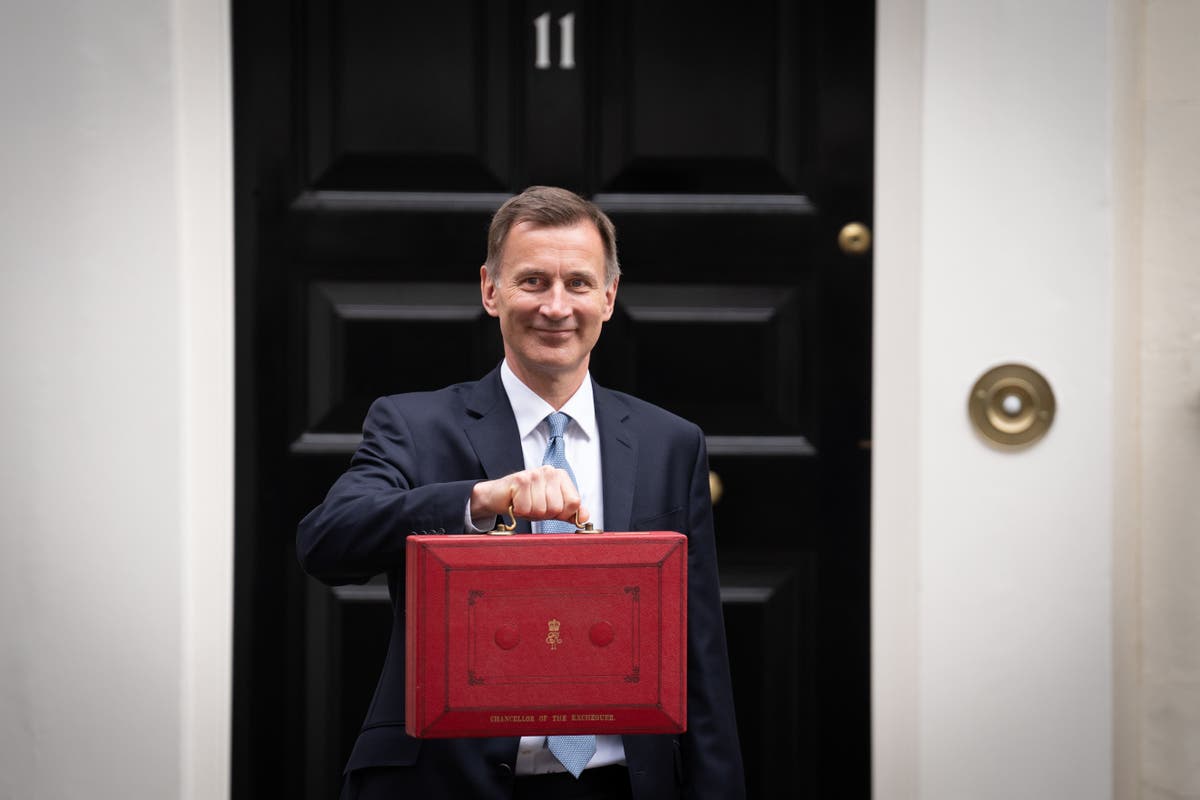Jeremy Hunt has been accused of trying to “punish” disabled people while offering tax cuts the Conservatives hope will turn around their electoral fortunes.
The chancellor is preparing to use the autumn statement to ease the tax burden on businesses and individuals, as he seeks to boost economic growth and win over disillusioned voters.
He will claim the government is turning a corner after the billions spent during the pandemic, declaring his measures show the Tories “reject big government, high spending and high tax.”
And he will pledge to unleash the “energy and enterprise” of the British people, with 110 “growth measures” to back UK businesses, as he says his economic plan is “working” but not yet finished.
It is thought the chancellor is likely to announce cuts to national insurance, with nod to falls in income tax to come. Mr Hunt will also reportedly freeze alcohol duty and increase the state pension by 8.5 per cent, in line with the triple-lock.
But hundreds of thousands of people with mobility and mental health problems are set to be told their benefits will be cut, by £4,680 a year, unless they find work they can do from home.
Sarah White, from Sense, the disability charity, said the move “looks sets to punish disabled people, adding more anxiety on to disabled households that are already struggling”.
The row over the plans erupted as:
- Treasury minister Laura Trott said falling inflation meant ministers could focus on cutting taxes for individuals as well as businesses.
- Mr Hunt received a significant boost as official figures showed the government had borrowed nearly £17 billion less than predicted this year.
- Former Tory leader Lord Hague said getting people back to work was “urgent” to balance the nation’s finances.
- The governor of the Bank of England warned inflation was still a threat.
- The Treasury confirmed a pay rise for nearly three million workers – with the national living wage to rise to £11.44 in April.
Rishi Sunak has warned the welfare system is “unsustainable”.
Ministers insist many on benefits can no longer be “written off” as incapable of working thanks to the post-Covid boom in remote positions.
The Department for Work and Pensions says that since the Covid pandemic the number of people inactive due to long-term sickness or disability has risen by almost half a million to a record high of 2.6 million.
Ahead of the autumn statement, in which other back-to-work measures are due to be set out, former Tory leader Lord Hague described the situation as “urgent”. He told Times Radio the numbers not working because of sickness were now “much higher after Covid, so it has become an urgent thing, if the Government is going to balance its books in any way, to address that.”
Laura Trott, chief secretary to the Treasury, said people had to do their “duty”. “If they are able to go out to work they should,” she said. “Those who can work and contribute should contribute.”
But charities condemned the plans.
James Taylor, from the disability equality charity Scope, said: “These proposals are likely to force disabled people to look for work even when they aren’t well enough.”
He added: “Threatening disabled people with more sanctions will not lead to more disabled people getting into and staying in work. Forcing disabled people into unsuitable jobs and cutting financial support in a cost of living crisis will be disastrous.”
Mr Hunt has said he will use the autumn statement to boost business investment and get people back into work “to deliver the growth our country needs”.
Personal taxes will also be cut, a Treasury minister signalled.
Ms Trott said that with inflation halved the government could now focus on growth and “cutting taxes for individuals”.
It is likely to be a cut to national insurance rather than income tax. The move is designed to boost dire Tory poll ratings and force Labour to say if it would reverse such a decision in government .
But a controversial proposed cut to inheritance tax, attacked as a boon to the wealthy, is now thought to be pushed back until at least next year.
Last week Mr Hunt told the Independent his “priority” for tax cuts would always be business tax cuts, designed to boost the economy.
Shadow work and pensions secretary Liz Kendall blamed Mr Sunak for the millions out of work.
She told Sky News: “It’s very interesting to see Rishi Sunak railing against the fact millions of people are out of work due to long-term sickness, saying it’s a scandal they’ve been written off. Well, who’s done that?.. it’s happened under their watch.”
Ms Kendall accused the Government of “desperately trying to wipe their hands for the last 13 years that they are responsible for”.
In the autumn statement, the Chancellor is also expected to introduce a pension ‘pot for life’ in a bid to help those with multiple pensions.
He will promise to reduce planning red tape and speed up access to the national grid, a key demand of industry.

William Turner is a seasoned U.K. correspondent with a deep understanding of domestic affairs. With a passion for British politics and culture, he provides insightful analysis and comprehensive coverage of events within the United Kingdom.








